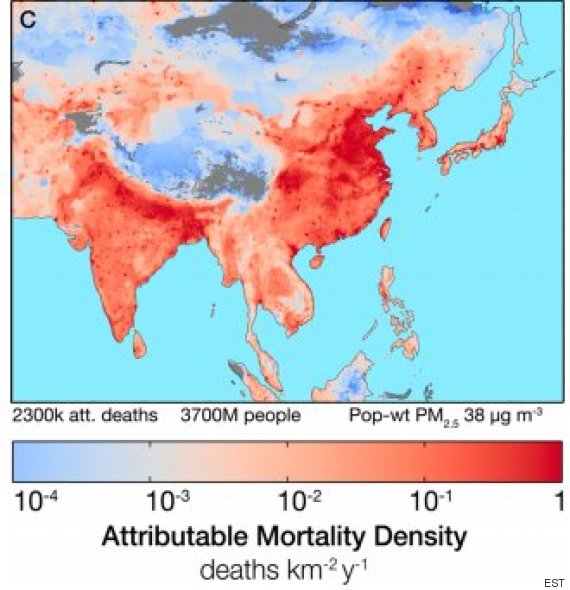The Indian government today said that 80 people are dying everyday from air pollution in Delhi. The alarming figure was disclosed by environment minister Prakash Javadekar in a written response in the Rajya Sabha.
Respirable particulate matter such as PM2.5 is one of the several factors responsible for morbidity and premature deaths.
"An international study released recently has claimed that foul air is killing up to 80 people a day in Delhi. The numbers of premature deaths given in the study are based on the constructive estimates and extrapolations of data," Javadekar said.
The findings are based on two studies commissioned by the Centre, 'Epidemiological Study on Effects of Air Pollution on Human Health in Delhi' during 2002-2005 and 'Study on Ambient Air Quality, Respiratory Symptoms and Lung Function of Children in Delhi' that was done between 2003-2005.
A global study on lethal health effects of pollution from particulate matter was published in June and had similar findings. Published in the journal 'Environmental Science & Technology', the study said that air pollution in Delhi kills between 10,000 to 30,000 people a year, which approximates to 80 deaths a day. Such deaths are mainly becuase of PM2.5, which are particles smaller than 2.5 micrometres and can pass into the lungs and from there to other organs of the body.
![yakub memon]()
The figure above shows extremely high levels of pollution in northern India, indicated in deep red. The regions in blue are least polluted.
The study was authored by Joshua Apte from University of Texas, Julian Marshall from University of Minnesota, Michael Brauer from University of British Columbia and Dr Aaron Cohen from Health Effects Institute. It says that the number of deaths in Delhi every hour from air pollution has risen by 3 times in the last two decades. This might go up by a further 20-30 percent if no measures are taken to reduce pollution.
India's safety standards say that PM2.5 should not be higher than 40 microgram per cubic metre, which itself is four times higher than the standards prescribed by the World Health Organisation. Most of the deaths from pollution are due to heart attack and strokes, which result from breathing PM2.5. If India adopts the WHO standard, 85 percent of the deaths can be prevented, the study said.
![]() Like Us On Facebook |
Like Us On Facebook |
![]() Follow Us On Twitter |
Follow Us On Twitter |
![]() Contact HuffPost India
Contact HuffPost India
Respirable particulate matter such as PM2.5 is one of the several factors responsible for morbidity and premature deaths.
"An international study released recently has claimed that foul air is killing up to 80 people a day in Delhi. The numbers of premature deaths given in the study are based on the constructive estimates and extrapolations of data," Javadekar said.
The findings are based on two studies commissioned by the Centre, 'Epidemiological Study on Effects of Air Pollution on Human Health in Delhi' during 2002-2005 and 'Study on Ambient Air Quality, Respiratory Symptoms and Lung Function of Children in Delhi' that was done between 2003-2005.
A global study on lethal health effects of pollution from particulate matter was published in June and had similar findings. Published in the journal 'Environmental Science & Technology', the study said that air pollution in Delhi kills between 10,000 to 30,000 people a year, which approximates to 80 deaths a day. Such deaths are mainly becuase of PM2.5, which are particles smaller than 2.5 micrometres and can pass into the lungs and from there to other organs of the body.

The figure above shows extremely high levels of pollution in northern India, indicated in deep red. The regions in blue are least polluted.
The study was authored by Joshua Apte from University of Texas, Julian Marshall from University of Minnesota, Michael Brauer from University of British Columbia and Dr Aaron Cohen from Health Effects Institute. It says that the number of deaths in Delhi every hour from air pollution has risen by 3 times in the last two decades. This might go up by a further 20-30 percent if no measures are taken to reduce pollution.
India's safety standards say that PM2.5 should not be higher than 40 microgram per cubic metre, which itself is four times higher than the standards prescribed by the World Health Organisation. Most of the deaths from pollution are due to heart attack and strokes, which result from breathing PM2.5. If India adopts the WHO standard, 85 percent of the deaths can be prevented, the study said.
 Like Us On Facebook |
Like Us On Facebook |  Follow Us On Twitter |
Follow Us On Twitter |